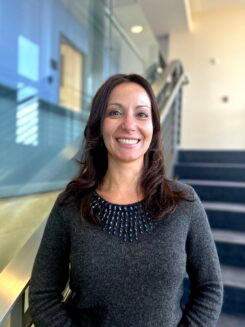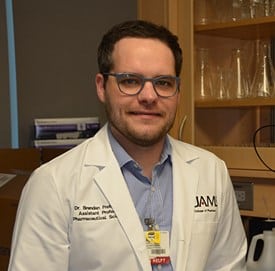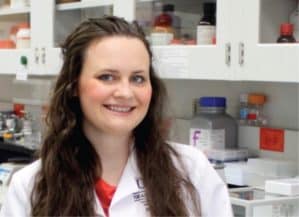Pearman Parker, Ph.D., MPH, RN, PMH-BC

Impact of a nurse-led mind-body intervention on sexual health in breast cancer
Pearman Parker, Ph.D., MPH, RN, PMH-BC, is an assistant professor in the UAMS College of Nursing, Department of Nursing Practice and Science and associate member of the Winthrop P. Rockefeller Cancer Institute. Dr. Parker received her education in journalism, public health, and nursing science from the University of Georgia and the University of South Carolina.
The EMBRACE (Empowerment through Mind and Body Reclamation After Cancer Experience) intervention is a longstanding nurse-led clinical sexual health psychoeducational intervention. Dr. Parker proposes to test the feasibility and efficacy of the EMBRACE intervention to improve sexual health, menopausal symptoms, and body image in breast cancer survivors.
For more information about her COBRE project, please see the website here: https://cancer.uams.edu/clinical-trial/improve-sexual-health-in-breast-cancer-survivorship/
Tatiana Wolfe, Ph.D.

Myelin mechanisms of brain synaptic dysfunction post breast cancer therapy
Tatiana Wolfe, Ph.D., is an Assistant Professor in the UAMS Brain Imaging Research Center in the College of Medicine, Psychiatric Research Institute. Dr Wolfe received her bachelor’s and doctorate in medical physics from the University of Sao Paulo in Brazil. She completed postdoctoral fellowships at UT MD Anderson Cancer Center, The Houston Methodist Hospital Research Institute, and served as medical imaging physicist scientist at Ohio State University.
In her COBRE project, she uses a novel modality of brain mapping by magnetic resonance spectroscopy imaging (MRSI) to measure molecular markers of synaptic health and myelination integrity in people who underwent chemotherapy for breast cancer to understand their possible role in chemotherapy-induced neurocognitive dysfunction.
Graduated Project Leaders
Antiño R. Allen, Ph.D.

Activation of the Nrf2 Pathway to Ameliorate Normal Tissue Damage and Cognitive Decline after Cancer Treatment.
Antiño R. Allen, Ph.D., is an associate professor in the UAMS College of Pharmacy Department of Pharmaceutical Sciences. Dr. Allen received his doctorate in evolution, ecology and behavior from Indiana University Bloomington. He developed an expertise in the effects of traumatic brain injury, radiation and chemotherapy on cognition during his postdoctoral training in the Department of Neurological Surgery, University of California San Francisco.
The overall goal of his COBRE project was to determine the protective effects of the superoxide dismutase mimetic MnBuOE on brain injury from doxorubicin, cyclophosphamide and paclitaxel, and the role of the transcription factor Nrf2 in this process.
Nukhet Aykin-Burns, Ph.D.

The Role of Tetrahydrobiopterin Bioavailability in Radiation-Induced Skin Injury.
Nukhet Aykin-Burns, Ph.D., is an associate professor in the UAMS College of Pharmacy Department of Pharmaceutical Sciences with an expertise in oxidative stress and mitochondrial function.
With support of the COBRE Center and other funding sources, Aykin-Burns has developed research projects to study adverse effects of ionizing radiation on skin, liver and bone.
Brendan Frett, Ph.D.

Concurrent TNF-α and TGF-β impairment to limit radiotherapy-induced pulmonary fibrosis
Brendan Frett, Ph.D., is an assistant professor in the UAMS College of Pharmacy, Department of Pharmaceutical Sciences. He received his doctorate in pharmaceutical sciences and his postdoctoral training in medicinal chemistry at the University of Arizona.
Frett has identified a small-molecule inhibitor of tumor necrosis factor-α (TNF-α) and transforming growth factor-β (TGF-β) signaling and will test whether this compound or iterations reduce radiation injury in the lung.
Ping-Ching Hsu, Ph.D.

Metabolic phenotypes of doxorubicin-induced cardiotoxicity in breast cancer
Ping-Ching Hsu, Ph.D. is an assistant professor in the UAMS College of Public Health, Department of Environmental and Occupational Health. She has a doctorate in tumor biology from Georgetown University and postdoctoral training in metabolomics from Ohio State University.
In her COBRE project, she works on a study that involves breast cancer patients to identify plasma metabolite panels that predict cardiac toxicity of chemotherapy.
Igor Koturbash, M.D., Ph.D.

Epigenetic Alterations Caused by Low-dose Ionizing Radiation.
Igor Koturbash, M.D., Ph.D., is associate professor and Chair of the UAMS College of Public Health, Department of Environmental and Occupational Health. He has a research expertise in low-dose radiation effects, epigenetics and toxicology. In addition, he established the UAMS Center for Dietary Supplements Research
Koturbash’s project used state-of-the-art technologies to assess DNA methylation in response to low doses of ionizing radiation.
Rupak Pathak, Ph.D.

Role of KLF2 in Regulating Intestinal Radiation Toxicity
Rupak Pathak, Ph.D., is an assistant professor in the UAMS College of Pharmacy Department of Pharmaceutical Sciences. He received his doctorate in radiation biology from Kalyani University (West Bengal, India) and postdoctoral training at the Armed Forces Radiobiology Research Institute (Bethesda, Maryland).
The overall goal of his COBRE project is to investigate the role of endothelial cells and the transcription factor KLF2, which plays a central role in endothelial function, on radiation-induced intestinal injury, with the ultimate goal of developing strategies to prevent or treat radiation enteropathy.
Snehalata Pawar, Ph.D.

Molecular Mechanisms of C/EBPδ in Ionizing Radiation Response
Snehalata Pawar, Ph.D., is a trained biochemist and assistant professor at SUNY Upstate Medical University with a research expertise in radiation-induced intracellular signaling. Prior to her position at SUNY, she was an assistant professor at the UAMS College of Pharmacy Department of Pharmaceutical Sciences where she developed research projects in models of radiation-induced injury in the bone marrow, small intestine and heart.
Pawar’s COBRE project was focused on the transcription factor C/EBPδ, known to play a role on cell cycle regulation and oxidative stress, in acute radiation damage in the bone marrow and small intestine.
Carolina Schinke, M.D.

Therapy-induced damage to the host bone marrow as a promoter of treatment resistance in multiple myeloma
Carolina Schinke, M.D., is a hematologist–oncologist and assistant professor at the Myeloma Center at the UAMS Cancer Institute. Prior to this position, she completed fellowships in hematology-oncology at Albert Einstein College of Medicine, New York.
For her COBRE project, she has access to a unique set of bone marrow biopsy samples obtained from myeloma patients. She will use these samples to identify how the effects of multiple myeloma treatment on the host bone marrow microenvironment may affect the response of myeloma cells to treatment.
Amanda Stolarz, Pharm.D., Ph.D.

Amanda Stolarz, Pharm.D., Ph.D., is an assistant professor in the UAMS College of Pharmacy, Department of Pharmaceutical Sciences. After completing her Doctor of Pharmacy, she obtained her doctorate and postdoctoral training in pharmacology from UAMS.
Mechanisms and prevention of doxorubicin-induced lymphedema
Her COBRE project is based on the observation that anthracyclines can enhance lymphedema. She studies the role of ryanodine receptors in the effects of anthracyclines on lymph vessel contraction, with the long-term goal of preventing or treating lymphedema in cancer patients.
Guangrong Zheng, Ph.D.

Development of Novel Tocotrienol-Based Radioprotective Agents
Guangrong Zheng, Ph.D., is a medicinal chemist and associate professor at the University of Florida, College of Pharmacy. Prior to this position, he was an associate professor at the UAMS College of Pharmacy, Department of Pharmaceutical Sciences.
Zheng’s COBRE project was focused on improving the bioavailability of g- and d-tocotrienols, two forms of vitamin E with significant radiation protection properties.
